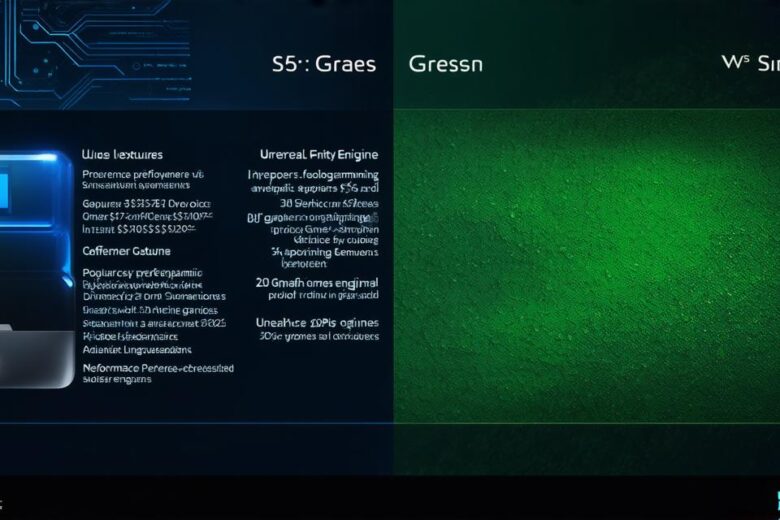Game development is an exciting industry that requires creativity, technical skills, and a deep understanding of different game engines. Two of the most popular game engines in use today are Unity and Unreal Engine. In this guide, we will compare these two engines to help you make an informed decision about which one to choose for your game development project.
What is Unity?
Unity is a cross-platform game engine that allows developers to create games for different platforms, including Windows, Mac, iOS, Android, and consoles. Unity was first released in 2005 and has since grown into a powerful and versatile tool used by both beginners and experienced developers. It supports various scripting languages, such as C and JavaScript, making it easy to develop games using the engine.
Key Features of Unity
- Cross-platform development: Unity allows developers to create games for multiple platforms with a single codebase.
- User-friendly interface: The engine has a user-friendly interface that makes it easy to create and edit game assets.
- Large community support: Unity has a large and active community of developers who provide support, resources, and plugins.
- Built-in tools: Unity comes with various built-in tools, such as an animation editor, particle system editor, and script debugger, that make it easy to create complex game effects.
- Scalability: Unity is scalable and can handle large game projects with ease.
- Integrations: Unity integrates well with other tools and services, making it easy to work with external assets and services.
- Pricing: Unity offers a free version that is suitable for small projects and a paid version for larger projects.
What is Unreal Engine?
Unreal Engine is a popular game engine developed by Epic Games. It was first released in 1998 and has since become one of the most widely used engines in the gaming industry. It supports various scripting languages, including C++ and Blueprints, making it easy to develop games using the engine.
Key Features of Unreal Engine
- High-performance graphics: Unreal Engine is known for its high-quality graphics and visual effects, making it an excellent choice for creating realistic and immersive games.
- Advanced physics simulation: Unreal Engine has a powerful physics engine that allows developers to create complex and realistic physics simulations in their games.
- Extensive plugin library: Unreal Engine has an extensive library of plugins and tools that make it easy to integrate external assets and services into your game.
- Flexible scripting language: Unreal Engine supports both C++ and Blueprints, making it easy for developers with different skill sets to work together on a project.
- Scalability: Unreal Engine is scalable and can handle large and complex game projects.
- Pricing: Unreal Engine offers a free version that is suitable for small projects and a paid version for larger projects.
Comparing Unity and Unreal Engine
Now that we have discussed the key features of both engines, let’s compare them to help you make an informed decision about which one to choose for your game development project.
Graphics Quality
Unreal Engine is known for its high-quality graphics and visual effects, making it an excellent choice for creating realistic and immersive games. However, Unity also offers high-quality graphics and has improved significantly in this area over the years.
Performance
Unreal Engine is generally considered to be more performant than Unity, especially when it comes to handling complex graphics and physics simulations. However, Unity has made significant improvements in this area in recent years and is now a viable option for high-performance games.
Scripting Language
Both engines support multiple scripting languages, but Unreal Engine’s plugin library is more extensive than Unity’s, making it easier to integrate external assets and services into your game. Additionally, Unreal Engine’s Blueprints scripting language is designed to be easy for beginners to use, while C++ is a more advanced language that offers more control over the engine.
Cross-Platform Development
Both engines support cross-platform development, allowing developers to create games for multiple platforms with a single codebase. However, Unreal Engine has a stronger presence in the console and PC gaming markets, making it a better choice for creating games that need to run on these platforms.
Pricing
Both engines offer a free version that is suitable for small projects and a paid version for larger projects. The cost of the paid versions varies depending on the features included, but both engines are relatively affordable compared to other game engines in the market.
FAQs
1. Is Unity better than Unreal Engine for mobile game development?
Unity is a popular choice for mobile game development due to its ease of use and cross-platform support. However, Unreal Engine also supports mobile development and has improved significantly in this area in recent years.
2. What is the difference between Unity and Unreal Engine’s scripting languages?
Unity uses C and JavaScript as its primary scripting languages, while Unreal Engine uses Blueprints and C++. Blueprints is designed to be easy for beginners to use, while C++ offers more control over the engine.
3. Which engine is better for creating games with complex physics simulations?
Both engines support complex physics simulations, but Unreal Engine’s physics engine is generally considered to be more powerful and advanced than Unity’s.
4. Which engine is better for beginners?
Both engines have beginner-friendly features, but Unreal Engine’s Blueprints scripting language is designed specifically for beginners, making it easier to get started with game development.
5. Which engine is more expensive?
Both engines offer a free version that is suitable for small projects and a paid version for larger projects. The cost of the paid versions varies depending on the features included, but both engines are relatively affordable compared to other game engines in the market.
Summary
In conclusion, Unity and Unreal Engine are two powerful game engines that offer similar features and capabilities. However, there are some key differences between the two engines that can affect your decision when choosing which one to use for your game development project. If you are looking for a high-performance engine with advanced graphics and physics simulation capabilities, Unreal Engine may be the better choice. On the other hand, if you are looking for an easy-to-use engine with cross-platform support and a large community of developers, Unity may be the better option for you. Ultimately, your decision will depend on the specific needs of your game development project and your own skillset as a developer.

